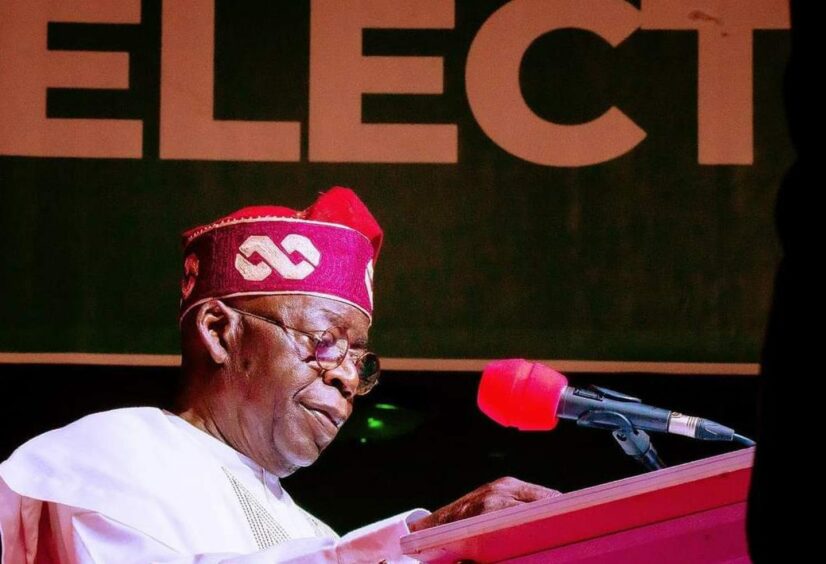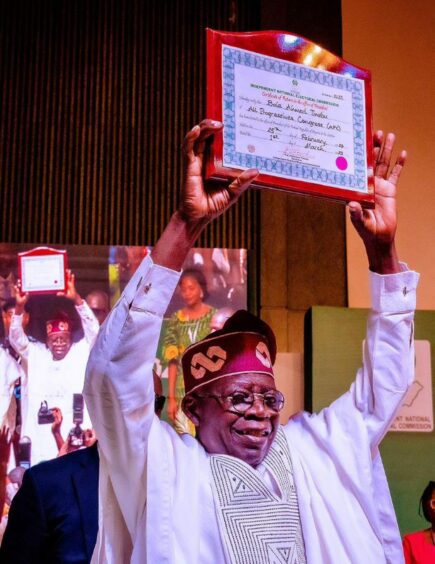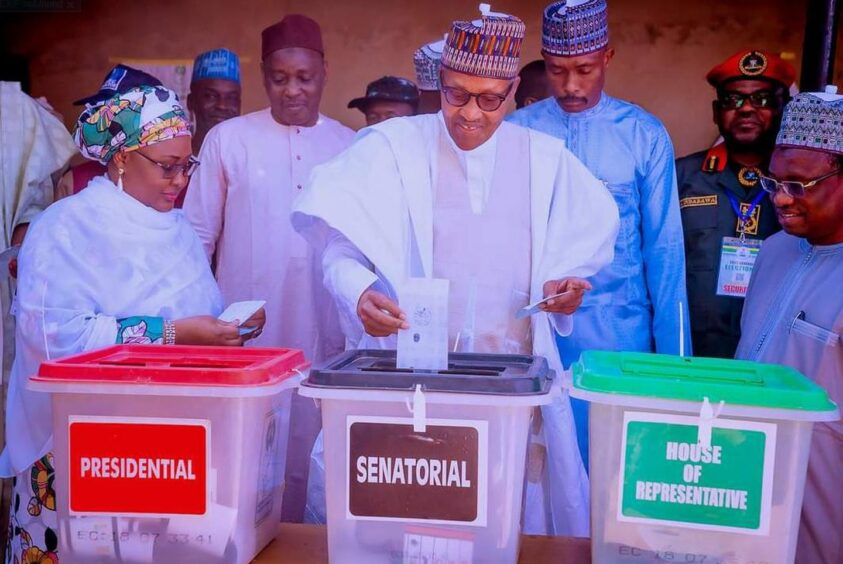
Nigeria has elected Bola Tinubu to be the next president of Nigeria, keeping the All Progressives Congress (APC) in control of the country.
The Independent National Electoral Commission (INEC) declared Tinubu had won on March 1, seeing off competition from 17 other presidential candidates. Nigerians voted on February 25 in the presidential election but turnout was low and there were a number of complaints around access to voting.
Three-way splits
One of the biggest surprises was the loss of Lagos State, Tinubu’s home, to the Labour Party candidate Peter Obi.
Songhai Advisory noted that the APC had struggled in the north. The consultancy attributed this to the outgoing President Muhammadu Buhari.
Under Buhari, the APC has become “increasingly unpopular during his eight-year rule due to the state of the economy and security. Consequently, the party lost the presidential election in Buhari’s Katsina and other key states in its northern base,” Songhai said.
Obi made progress with urban youths and Christians in the north, Songhai continued. The presence of the Labour Party candidate helped split the vote in the south, where the main opposition Peoples Democratic Party (PDP) candidate Atiku Abubakar was expected to make progress.
There have been calls for fresh elections and legal challenges. However, Songhai said the political process is stable and the new president would be sworn in on May 29.
Election observers said the vote “fell well short” of reasonable expectations. They raised concerns around INEC’s work, a lack of transparency and “unchecked political violence before and during the elections overshadowed incremental administrative gains achieved in the pre-election period”.
Mayer Brown partner Kwadwo Sarkodie, specialising in arbitration, said the fact that Tinubu and Buhari were from the same party suggested a smooth transition.
“In campaigning, President Tinubu has promised new ideas and reforms. These are urgently needed to address some of the major and long-standing challenges which Nigeria faces – including a stagnant economy, an employment market which has not kept pace with a large and growing population and high debt servicing costs.”
Mixed mandate on fuel
One of the problems the country – and the new president face – is around access to fuel. The International Republican Institute (IRI) and National Democratic Institute (NDI) said this – and the currency crisis – “imposed excessive burdens on voters and election officials”.
While access to fuel became particularly difficult in the election, with concerns from marketers about unrest, it extends beyond voting season.
Nigerian National Petroleum Co. (NNPC) sells petrol at 185 naira ($0.4) per litre. However, independent marketers have been selling at 250-350 naira ($0.54-0.76).
“According to Tinubu’s manifesto and his stated position on Nigeria’s fuel subsidy regime, the sector is expected to undergo a transformation, specifically, the potential end to the unsustainable fuel subsidy structure,” said SBM Intelligence senior energy analyst Ese Osawmonyi.
Nigerian governments have been trying to move away from the fuel subsidy scheme for years. However, none have been able to follow through and pay the political price.
Renaissance Capital global chief economist Charlie Robertson noted that less than one in 10 adult Nigerians voted for the new president. This “isn’t much support when he has to do painful reforms”, he said on LinkedIn.
Tinubu won 36% of the votes cast, securing support from 12 of the 36 states. He received 8.79 million votes on Saturday, while Buhari – in 2019 – pulled in 15.19mn. In February, authorities had registered 93.4mn people as eligible. However, INEC counted under 25mn votes in the election.
The Dangote Refinery is due to start up this year, which should help ensure access to fuel. However, the start does not necessarily mean prices will come down.
Doing deals
Mayer Brown’s Sarkodie speculated that the passing of the election would unlock new investments.
“The prospect of reforms, the lifting of the uncertainty an election inevitably brings and the fact that a number of major investments, projects and policy decisions – previously stalled pending the election – are now set to go ahead all offers positive news for investors,” he said. “Risks and challenges persist, however, and it will remain important for investors to ensure that their investments are protected by clearly drafted contract terms.”
The lawyer suggested that companies structure investments to benefit from bilateral investment treaties that Nigeria has struck with various countries.
Bracewell partner Adam Blythe said the energy industry would welcome the new president.
“Tinubu represents something of a continuity candidate and he has indicated a willingness to continue to implement the [Petroleum Industry Act] PIA. While there is a wider election process still to run and be completed, a Tinubu presidency may increase the chance of ministerial consents being issued for upstream M&A deals during the upcoming ‘lame duck’ period.”
Seplat squeeze
One deal has become emblematic of the disarray in Nigeria: Seplat Energy’s attempts to buy ExxonMobil’s local subsidiary.
The London-listed independent sketched out its plan in February 2022 for the move. Initially it won support from President Buhari, before the Nigerian Upstream Petroleum Regulatory Commission (NUPRC) rejected the move. The sale, it said, was a matter for the regulator rather than the minister.
Seplat has a rival for Mobil Producing Nigeria Unlimited (MPNU) in NNPC, which is claiming pre-emption rights.
NNPC’s insistence on “having first dibs on the Seplat/Mobil M&A transaction makes the problem around it evident,” said SBM’s Osawmonyi.
“Since the administration’s first priority should be to boost and solidify investor confidence across all sectors and industries of the Nigerian economy, I do not anticipate the presidency getting involved in these conversations right away,” she said.
Sticking points
Welligence Energy Analytics vice president for sub-Saharan Africa research Obo Idornigie noted Tinubu’s comments on the PIA.
“I think one of his first steps will be to set up a committee to review the sticking points in the PIA with the industry stakeholders. Addressing some of the industry concerns will be critical to driving investment, particularly in deepwater,” Idornigie said.
He called for the government to shake up the upstream corporate landscape as a priority. “They should support transactions that will bring in competent E&P players, particularly brownfield experts into the onshore and shallow water sectors. In the deepwater sector, attracting other capable IOCs outside of the Majors with deepwater expertise and access to financing must also be on the front burner.”
Tinubu has also commented on the slow pace at which projects move forwards, the Welligence analyst said. “We expect he will be looking closely at how to streamline the bureaucratic process.”
Amid this, there continue to be challenges in the Niger Delta around security. SBM’s Osawmonyi noted that militants sceptical of the new administration “may ramp up production theft and leakages”.
Tinubu faces a tough challenge, given his role as continuity candidate. There is a stack of problems facing Nigeria in the near term. It faces high debt payments, an over burdened power sector and payment issues caused by the new naira issue.
Carving out time to drive progress in the energy sector, shifting fuel supplies to a more sustainable basis, while also opening the upstream to new investments – all with less direct political support than Buhari managed in the last election – will test the mettle of the head of Africa’s largest democracy.

 © Supplied by APC
© Supplied by APC © Supplied by APC
© Supplied by APC